In the broader context of racism against Black Americans and racism in the United States, mass racial violence in the United States consists of ethnic conflicts and race riots, along with such events as:
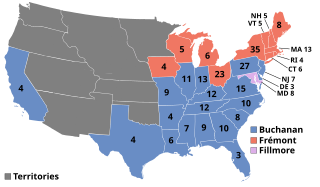
The 1856 United States presidential election was the 18th quadrennial presidential election, held on Tuesday, November 4, 1856. In a three-way election, Democrat James Buchanan defeated Republican nominee John C. Frémont and Know Nothing nominee Millard Fillmore. The main issue was the expansion of slavery as facilitated by the Kansas–Nebraska Act of 1854. Buchanan defeated President Franklin Pierce at the 1856 Democratic National Convention for the nomination. Pierce had become widely unpopular in the North because of his support for the pro-slavery faction in the ongoing civil war in territorial Kansas, and Buchanan, a former Secretary of State, had avoided the divisive debates over the Kansas–Nebraska Act by being in Europe as the Ambassador to the United Kingdom.

John Neely Johnson was an American lawyer and politician. He was elected as the fourth governor of California from 1856 to 1858, and later appointed justice to the Nevada Supreme Court from 1867 to 1871. As a member of the American Party, Johnson remains one of only three members of a third party to be elected to the California governorship.

Thomas Swann was an American lawyer and politician who also was President of the Baltimore and Ohio Railroad as it completed track to Wheeling and gained access to the Ohio River Valley. Initially a Know-Nothing, and later a Democrat, Swann served as the 19th Mayor of Baltimore (1856–1860), later as the 33rd Governor of Maryland (1866–1869), and subsequently as U.S. Representative ("Congressman") from Maryland's 3rd congressional district and then 4th congressional district (1869–1879), representing the Baltimore area.

The Plug Uglies were an American Nativist criminal street gang, sometimes referred to loosely as a political club, that operated in the west side of Baltimore, Maryland, from 1854 to 1865. The term plug ugly was used to identify an extremely tough ferocious fighter who could give a sound beating to an opponent, with the Plug Uglies' name additionally stemming from their practice of stuffing oversized plug hats with wool and leather, pulling them down over their ears for head protection as primitive helmets during the numerous street battles they participated in. The name Plug Uglies was used to refer to a number of criminal gangs in New York City as well as Philadelphia.
Herbert Asbury was an American journalist and writer best known for his books detailing crime during the 19th and early-20th centuries, such as Gem of the Prairie: An Informal History of the Chicago Underworld, The Barbary Coast: An Informal History of the San Francisco Underworld, Sucker's Progress: An Informal History of Gambling in America and The Gangs of New York.
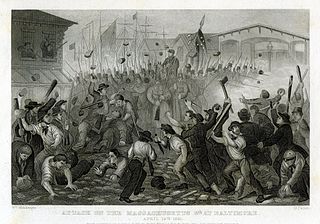
The Bloody Tubs or Blood Tubs were a 19th-century gang of opportunistic street thugs in Baltimore, Maryland, and Philadelphia, Pennsylvania, who worked primarily for Nativist Know Nothing politicians to commit election fraud.
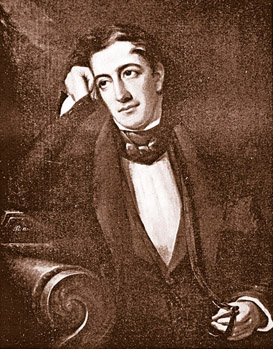
Lewis Charles Levin was an American politician, newspaper editor and anti-Catholic social activist. He was one of the founders of the American Party in 1842 and served as a member of the U. S. House of Representatives representing Pennsylvania's 1st congressional district from 1845 to 1851. Levin was the first Jewish U.S. Congressman, although David Levy Yulee served as a territorial representative from Florida prior to Levin's election to the House.
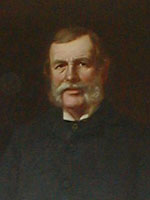
Henry Joseph Gardner was the 23rd Governor of Massachusetts, serving from 1855 to 1858. Gardner, a Know Nothing, was elected governor as part of the sweeping victory of Know Nothing candidates in the Massachusetts elections of 1854.

The Know-Nothing Riots of 1856 occurred in Baltimore between September and November of that year. The Know-Nothing Party gained traction in Baltimore as native-born residents disliked the growing immigrant population. Local street gangs became divided on political grounds, with the Know-Nothing affiliated gangs clashing with Democrat affiliated gangs. The partisans were involved in widespread violence at the polls and across Baltimore during municipal and national elections that year.

The American Republican Party was a minor anti-Catholic, anti-immigration, and nativist political organization that was launched in New York in June 1843, largely as a protest against immigrant voters and officeholders.
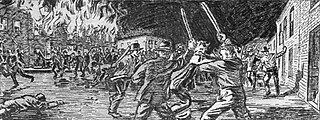
Bloody Monday was a series of riots on August 6, 1855, in Louisville, Kentucky, an election day, when Protestant mobs attacked Irish and German Catholic neighborhoods. These riots grew out of the bitter rivalry between the Democrats and the Nativist Know-Nothing Party. Multiple street fights raged, leaving twenty-two people dead, scores injured, and much property destroyed by fire. Five people were later indicted, but none were convicted, and the victims were not compensated.
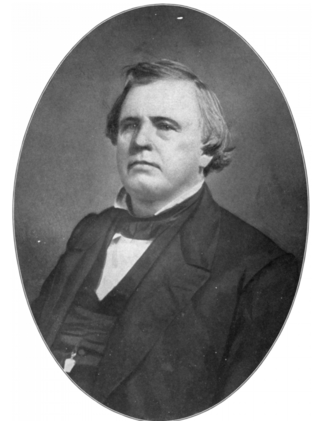
William Beans Magruder (1810–1869) was a prominent physician and the seventeenth Mayor of Washington City, District of Columbia, from 1856 to 1858.

The Know Nothing movement was a nativist political movement in the United States in the mid-1850s. The national political organization of the Know Nothings was officially known as the "Native American Party" prior to 1855; thereafter, it was simply known as the "American Party". Members of the movement were required to say "I know nothing" whenever they were asked about its specifics by outsiders, providing the group with its colloquial name.
Henry Stump (1795–1865) served as Judge of the Criminal Court, 5th Judicial Circuit in Baltimore, Maryland, United States, from 1851 to 1860, one of the most lawless and politically violent decades in Baltimore history. He presided over the infamous trial of Plug-Ugly Henry Gambrill for the murder of a Baltimore police officer. In 1860, the Maryland General Assembly removed Stump from office for "misbehavior," the only jurist in Maryland history to be removed from the bench. Stump was also an eyewitness to the April 19, 1861 riots in Baltimore that marked the first bloodshed in the American Civil War.
Captain Isaiah Rynders was an American businessman, sportsman, underworld figure and political organizer for Tammany Hall. Founder of the Empire Club, a powerful political organization in New York during the mid-19th century, his "sluggers" committed voter intimidation and election fraud on behalf of Tammany Hall throughout the 1840s and 1850s before Tammany became an exclusively Irish-dominated institution.

The Cincinnati riot of 1853 was triggered by the visit of then-Archbishop Gaetano Bedini, the emissary of Pope Pius IX, to Cincinnati, Ohio, on 21 December 1853. The German Liberal population of the city, many of whom had come to America after the Revolutions of 1848, identified Cardinal Bedini with their reactionary opponents. An armed mob of about 500 German men with 100 women following marched on the home of Bishop John Purcell, protesting the visit. One protester was killed and more than 60 were arrested.

The Cincinnati Riots of 1855 were clashes between "nativists" and German-Americans. The nativists supported J. D. Taylor, the mayoral candidate for the anti-immigrant American Party, also known as the Know-Nothing Party. During the riots, German-Americans erected barricades in the streets leading into their Over-the-Rhine neighborhood, and fired a cannon over the heads of a mob of nativists attacking them.

In the 1855 Chicago mayoral election, Know Nothing candidate Levi Boone defeated Democratic incumbent Isaac Lawrence Milliken by a 5.75% margin.


















